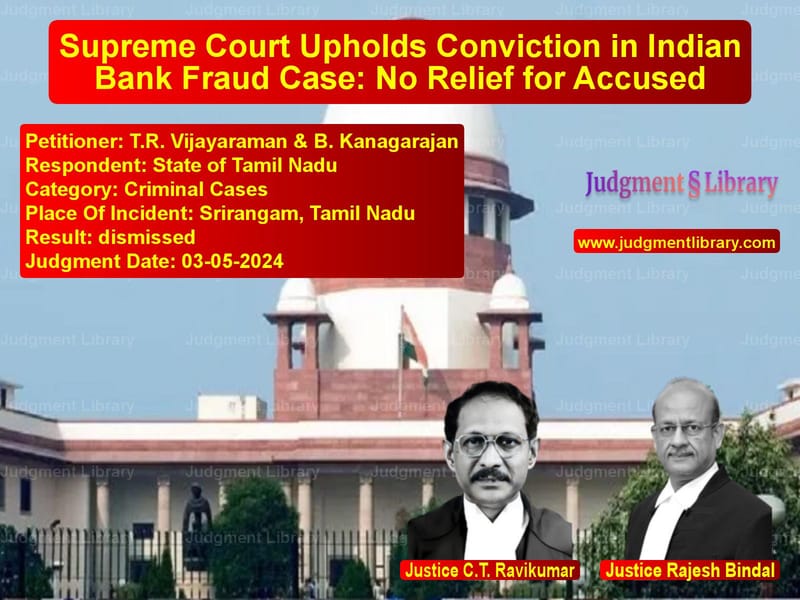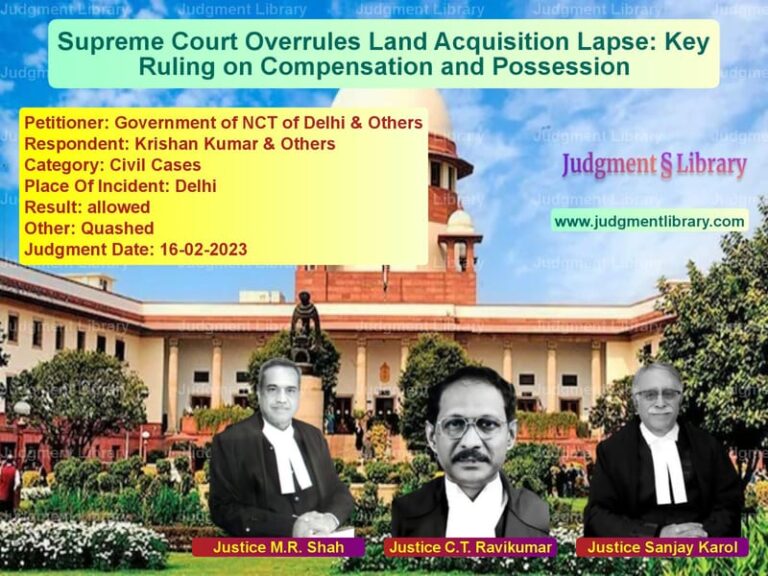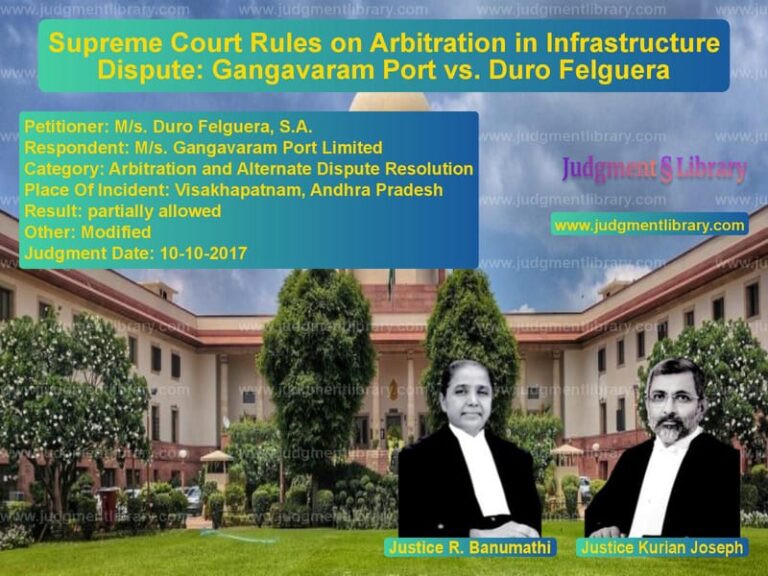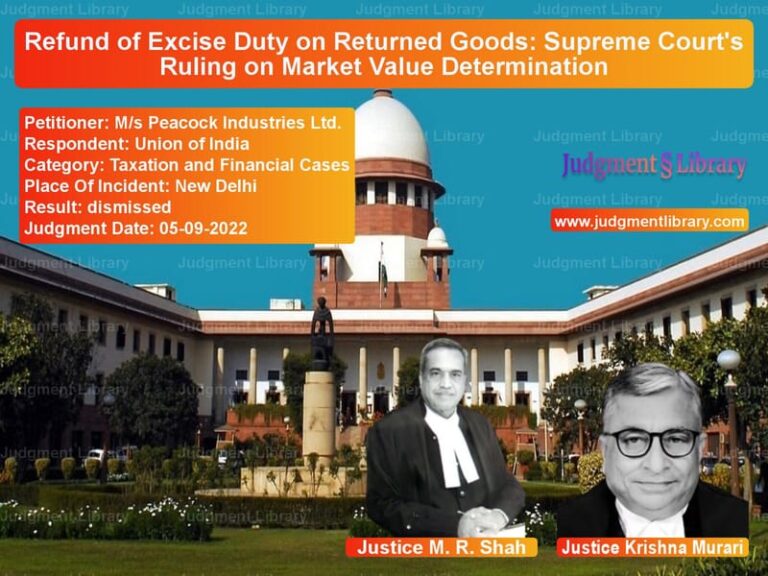Supreme Court Upholds Conviction in Indian Bank Fraud Case: No Relief for Accused
The Supreme Court of India has delivered a crucial ruling in T.R. Vijayaraman vs. State of Tamil Nadu, reinforcing strict action against banking fraud and financial irregularities. The case revolved around fraudulent transactions at the Indian Bank, Srirangam Branch, where the accused, in collusion with bank officials, secured interest-free advances by manipulating bank records. The Court upheld the conviction of the accused, dismissing their pleas for leniency.
Background of the Case
The case originated from an investigation into fraudulent transactions at the Srirangam Branch of Indian Bank. The petitioners, T.R. Vijayaraman and B. Kanagarajan, were private businessmen who, in conspiracy with bank officials, secured unauthorized overdrafts and loans through fraudulent means.
Chronology of Events
- 2002: The accused were granted unauthorized overdrafts and temporary advances without proper documentation.
- 2004: Indian Bank’s internal inspection discovered irregular entries in the clearing account, leading to the exposure of the fraudulent transactions.
- 2004: The Central Bureau of Investigation (CBI) registered FIR No. RC MA1 2004 A 0061 under Sections 120-B, 420, and 477(A) of the Indian Penal Code and Section 13(2) read with Section 13(1)(d) of the Prevention of Corruption Act, 1988.
- 2008: The II Additional District Judge for CBI Cases, Madurai, convicted the accused, sentencing them to five years of rigorous imprisonment and imposing fines of Rs. 5,000 each.
- 2016: The Madras High Court upheld the trial court’s decision.
- 2024: The Supreme Court dismissed the special leave petitions filed by the accused, directing them to surrender within two weeks.
Legal Issues Considered
The Supreme Court examined several key legal questions:
- Whether the accused actively participated in the fraud or were mere beneficiaries.
- Whether the fraudulent transactions constituted a criminal offense under the IPC and Prevention of Corruption Act.
- Whether the High Court’s judgment lacked detailed reasoning.
Arguments by the Appellants (T.R. Vijayaraman & B. Kanagarajan)
The appellants, represented by Senior Counsel, argued:
- They were unaware of the fraudulent activities carried out by the bank officials.
- The financial transactions were regular business dealings and did not constitute cheating.
- The bank did not suffer any financial loss as the amounts were repaid.
- The High Court did not provide a detailed analysis of the evidence before upholding the conviction.
Arguments by the Respondent (State of Tamil Nadu)
The State, represented by the CBI, contended:
- The accused were direct beneficiaries of fraudulent transactions that provided them interest-free loans.
- Unauthorized debits in the bank’s external clearing and local drafts accounts were used to fund these advances.
- The accused immediately repaid the amounts after being confronted, which indicated their awareness of the fraud.
- The High Court had considered all relevant facts before confirming the conviction.
Supreme Court’s Judgment
The Supreme Court ruled against the appellants, holding that:
“The petitioners cannot escape liability by claiming ignorance of the manner in which fraudulent entries were made in the bank’s books of accounts. The trial court and the High Court have rightly found that the accused, in connivance with bank officials, secured undue financial advantages.”
- The Court found that the appellants actively participated in the fraud by receiving unauthorized advances.
- The repayment of the amounts after detection did not absolve them of criminal liability.
- The High Court’s judgment was not flawed simply because it did not re-analyze all evidence when affirming the trial court’s decision.
- The accused must surrender within two weeks to serve their sentence.
Impact of the Judgment
The Supreme Court’s ruling has several significant implications:
- Reaffirmation of Strict Action Against Financial Fraud: The judgment reinforces that individuals benefiting from banking frauds will be held accountable, even if they are not bank employees.
- Emphasis on Due Process: The ruling highlights that courts will not interfere in concurrent findings of lower courts unless there is a gross miscarriage of justice.
- Discouragement of White-Collar Crimes: By refusing to grant relief to the appellants, the Supreme Court has sent a strong message against financial malpractices.
Conclusion
The Supreme Court’s decision in T.R. Vijayaraman vs. State of Tamil Nadu upholds the principles of financial integrity and accountability. The ruling makes it clear that involvement in fraudulent transactions will not be excused merely because the funds were repaid. This judgment strengthens the legal framework against banking fraud and ensures that perpetrators of financial crimes face the full force of the law.
Petitioner Name: T.R. Vijayaraman & B. Kanagarajan.Respondent Name: State of Tamil Nadu.Judgment By: Justice C.T. Ravikumar, Justice Rajesh Bindal.Place Of Incident: Srirangam, Tamil Nadu.Judgment Date: 03-05-2024.
Don’t miss out on the full details! Download the complete judgment in PDF format below and gain valuable insights instantly!
Download Judgment: t.r.-vijayaraman-&-b-vs-state-of-tamil-nadu-supreme-court-of-india-judgment-dated-03-05-2024.pdf
Directly Download Judgment: Directly download this Judgment
See all petitions in Fraud and Forgery
See all petitions in Money Laundering Cases
See all petitions in Judgment by C.T. Ravikumar
See all petitions in Judgment by Rajesh Bindal
See all petitions in dismissed
See all petitions in supreme court of India judgments May 2024
See all petitions in 2024 judgments
See all posts in Criminal Cases Category
See all allowed petitions in Criminal Cases Category
See all Dismissed petitions in Criminal Cases Category
See all partially allowed petitions in Criminal Cases Category







